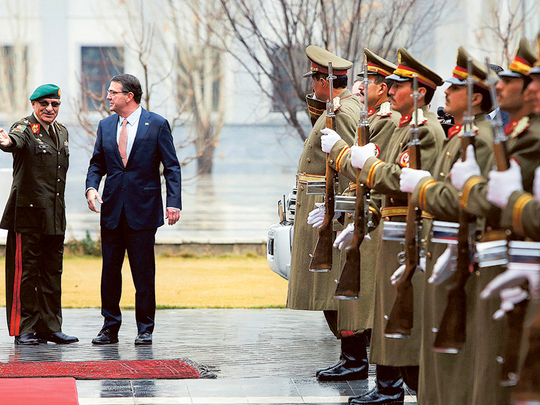
KABUL, Afghanistan: Four days after he was sworn in as defence secretary, Ashton B. Carter arrived in Afghanistan on Saturday morning to begin his own assessment of the security situation here since the United States wound down its combat mission last year.
Carter said he had seen varying reports about Afghanistan, including some that said the Taliban were undergoing a resurgence and others that claimed that a small number of militants had rebranded themselves as members of the Daesh.
He said he needed to travel to Afghanistan so he could meet with senior US and Afghan officials and make his own assessment. He will begin with meetings with President Ashraf Gani and Gani’s chief executive, Abdullah Abdullah.
Speaking with reporters on his military plane on the flight to Afghanistan, Carter said he had a number of questions: “How are the Afghan security forces doing? What is their assessment of the battlefield situation? What is their assessment of their prospects going forward? And what’s the best way that we can support them going forward?”
Carter said that when he met with President Barack Obama on Tuesday, the day he was sworn in, they discussed Afghanistan.
“We’re looking for success in Afghanistan that is lasting, the lasting accomplishment of our mission here and how to do that,” Carter said. “And the best way to do that is precisely what I’m here to assess.”
He said that although the United States ended its combat mission a month and a half ago, there were still 10,000 troops here. The troops are conducting counterterrorism operations and advising the Afghan military. Most US troops are scheduled to leave by the end of 2016.
“They come first in my mind always — their welfare — particularly in circumstances like this,” Carter said of the troops.
Carter is Obama’s fourth Pentagon chief. He served as the Pentagon’s No. 2 official earlier in Obama’s tenure and is seen as a technocrat largely untested on the international stage.
Afghanistan’s security forces have improved greatly, but the country is still struggling with a resilient insurgency 13 years after US troops invaded and toppled the Taliban regime. Many Afghans worry that Obama is risking an Iraq-like relapse in security by cutting American troop totals in half this year.
He said he will meet with Gen. John Campbell, the top US commander in Afghanistan, as well as Gen. Lloyd Austin, who as head of Central Command has overall responsibility for US military operations in the greater Middle East.
In response to a question about Iraq, Carter said any efforts to push Daesh out of the northern city of Mosul would be led by Iraqis and supported by the US military. He did not say when such action would begin, although some US military officials have said it will occur sometime this spring.
Carter said that he was open to hearing recommendations from his military commanders about whether a limited number of US troops should be used to retake the city.
“I think what’s important is that the campaign to retake Mosul succeeds, and we’re committed to that success and not to a particular timetable,” he said.
— New York Times News Service and AP












